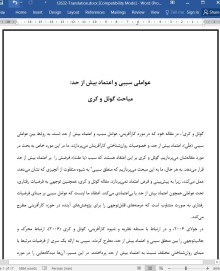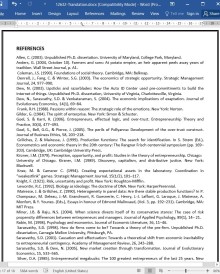
دانلود مقاله عواملی سببی و اعتماد بیش از حد
گوئل و کری ، در مقاله خود که در مورد کارآفرینی، عوامل سبب، و اعتماد بیش از حد است، به روابط بین عواملی سببی (علّی)، اعتماد بیش از حد، و خصوصیات روانشناختی کارآفرینان میپردازند. ما در این مورد خاص به بحث در مورد مقالهشان میپردازیم. گوئل و کری بر این اعتقاد هستند که سبب (یا علت)، فرضش را بر اعتماد بیش از حد قرار میدهد. به هر حال، ما به این مبحث میپردازیم که منطق سببی به شیوه متقاوت از آنچیزی که نشان میدهد، عمل میکند، زیرا به پیشبینی و فرض اعتماد نمیپردازد. مقاله گوئل و کری، همچنین توجهی به فرضیات رفتاری، تحت عواملی همچون اعتماد بیش از حد یا بیاعتمادی میکند. اعتقاد ما اینست که عوامل سببی بر مبنای فرضیات رفتاری به صورت متناوب است که عرصههای قابلتوجهی را برای پژوهشهای آینده در حوزه کارآفرینی مطرح میکند.
در جولای 2006، و در ارتباط با مسئله نظریه و شیوه کارآفرینی، گوئل و کری (2006)، ارتباط محرّک و جالبتوجهی را بین منطق سببی و اعتماد بیش از حد، مطرح کردند. سپس به ارائه یک سری از فرضیات مرتبط با مبنای روانشناختی مختلف نسبت به اعتماد بیش از حد پرداختند. در این مسیر، آنها دیدگاههایی را در مورد مباحث جالبتوجه منطق سببی و همچنین فرضیات رفتاری، و تحت نظریههای کارآفرینی اصلی مطرح کردند.
این مباحث پایه (که در بخش چکیده این مقاله عنوان شد) به صورت زیر است:
خصوصیات شخصیتی خاص کارآفرین، در تعامل با منطق سببی است تا کارآفرین را در معرض اعتماد بیش از حد قرار دهد (صفحه 477).
در مقالهشان، آنها به بیان درجاتی از ارتباط، بین سبب و اعتماد بیش از حد (که در مثال مربوط به شرکت سیمپلات جدول 1 و تحلیل جدول 2 آورده شده است) و همچنین پیوندهای بین خصوصیات کارآفرینی ویژه و اعتماد بیش از حد (که در حدول 3 به طور خلاصه آورده شده است)، پرداختند. به هر حال، پیوندهای بین خصوصیات کارآفرینی و سبب، مشخصا توسعه نیافته است.
در پاسخ به مباحث بعدی، به بررسی هر سه مجموعه این پیوندها با توجه به 1) تعمیق درکمان از الگوی سبب و 2) پیشبرد و ترکیب مجموعه گستردهای از نظریات در حوزه پژوهش کارآفرینی که مرتبط با رفتار، شناخت، و عمل است، میپردازیم. ما این سه مرحله را تشریح میکنیم. ابتدائا مفهوم اعتماد بیش از حد و بیاعتمادی را پذیرفته و به بررسی کاربرد آن در حوزه منطق سببی به طور کل، و در مورد شرکت سیمپلات به طور خاص میپردازیم. سپس به بررسی رابطه بین خصوصیات روانشناختی کارآفزینان و منطق سببی میپردازیم. سپس به طرح اهداف کلیدی مرتبط با فرضیات رفتاری، تحت عواملی همچون اعتماد بیش از حد و بیاعتمادی پرداخته، و گزینهای را مطرح میکنیم که عرصههای جالبتوجهی را برای پژوهشهای آینده در حوزه کارآفرینی مطرح میکند.
نتیجهگیری
از طریق پیوند بین عوامل سببی و اعتماد بیش از حد، امید ما بر این است که مقاله گوئل و کری، محققان بخش کارافرینی را تحریک کند تا نه تنها به ارزیابی این موضوعات با شدت بیشتر بپردازند، بلکه به بررسی فرضیات رفتاری مورد استفاده در پژوهشهای کارافرینی بپردازمد و این مورد را مد نظر قرار دهند که چگونه این فرضیات، روش تفسیر ما در مورد نظریه را تغییر میدهد. طبق نظر ما، به منظور توجه به پدیده کارآفرینی از طریق عوامل سببی باید به محدودسازی فرضیه مان در حوزه پیشبینی، فرصتطلبی، و دستهبندی روانشناختی پرداخته و به تعمیق فرضیاتمان در حوزه نوعدوستی، ناهمگنی، تغییرپذیری و بافت بپردازیم. زمانی که به یک نتیجه واحد رسیدیم-اگرچه این روند به عنوان مفهوم مهمی در سناریوهای تصادفی است- بطور ساده میتوانیم ببینیم که چرا اعتماد بیش از حد، در شرایط سببی، به شدن نامربوط خواهد بود.
این مفهوم که پدیدههای کارآفرینی، از طریق مجموعه رفتارهایی همچون حس نوعدوستی متفاوت است، میتواند در چندین مسیر دیگری که نشاندهنده عرصههای تولید برای پژوهشهای آینده باشد، توسعه یابد. به عنوان نمونه، مفهوم «کشف فرصتها» را مد نظر قرار دهید. همانطور که در مقاله کیرزنر (1979، 1989) عنوان شد، کشف فرصتها بر مبنای اصل «کاوشگران» است- یعنی کارافرینانی که فرصتهایی را کشف میکنند، به عنوان صاحبان منافع کارافرینی حاصل از فرصتها هستند. این نتایج از لحاظ منطقی، جنبه ذهنیتگرای کیرزنر را نشان میدهد. به هر حال، هر چه این جنبه بر مبای اهدافش، حائز اهمیت باشد، تنها میتواند بخشی از اکتشاف فرصتها را توضیح دهد.
In their article on entrepreneurship, effectuation, and over-trust, Goel and Karri suggest relationships between effectuation, over-trust, and certain psychological characteristics of entrepreneurs. In this response we debate their article. Goel and Karri are correct in claiming that effectuation supposes over-trust. However, we argue that effectual logic works in a different way than they presented because it neither predicts nor assumes trust. Goel and Karri’s article also draws attention to the behavioral assumptions underlying constructs such as over-(under) trust. Our suggestion is that effectuation is based on alternative behavioral assumptions that open up interesting avenues for future research in entrepreneurship.
In the July 2006 issue of Entrepreneurship Theory and Practice, Goel and Karri (2006) made an interesting and provocative link between effectual logic and over-trust. They then went on to develop a series of propositions relating various psychological constructs to over-trust. In doing so, they opened the door to an interesting conversation not only about effectual logic but also about the behavioral assumptions underlying major theories of entrepreneurship.
Their central argument (as stated in the abstract of the paper) goes as follows:
Specific personality characteristics of the entrepreneur interact with effectual logic to make the entrepreneur more susceptible to over-trust (p. 477). In their article, they develop in some length the links between effectuation and over-trust (laid out in the Simplot example in Table 1 and the analysis in Table 2) as well as the links between certain entrepreneurial characteristics and over-trust (summarized in Table 3). Links between entrepreneurial characteristics and effectuation, however, are not explicitly developed.
In our response in succeeding discussions, we examine all three sets of links with a view to (1) deepening our understanding of the effectuation model itself and (2) furthering and cumulating larger streams of theorizing in the field of entrepreneurship research that have to do with behavior, cognition, and action. We proceed in three steps. First we accept the concept of over- (under) trust and examine its implications for the use of effectual logic in general and the Simplot case in particular. Next we scrutinize the relationship between the psychological characteristics of entrepreneurs and the use of effectual logic. Finally we outline a key objection to the behavioral assumptions underlying constructs such as over- (under) trust and suggest an alternative that opens up interesting avenues for future research in entrepreneurship.
Conclusion
By making a link between effectuation and over-trust, our hope is that Goel and Karri’s article might stimulate entrepreneurship researchers not only to investigate these topics in more depth but also to scrutinize the behavioral assumptions used in entrepreneurship research with an eye to how these assumptions inform the way we interpret theory. In our view, in order to look at entrepreneurial phenomena through an effectual lens we need to weaken our assumptions about prediction, opportunism, and psychological stratification and deepen them on intelligent altruism, heterogeneity, lability, and contextuality. Once we shed our monistic baggage, it is easier to see why over-trust—although it may be an important concept in a causal scenario—is largely irrelevant in effectual ones.
This notion that entrepreneurial phenomena look different through the lens of behaviors such as intelligent altruism can be extended in a number of other directions that we think may present productive avenues for future research. Take, for instance, the notion of “opportunity discovery.” As outlined in the work of Kirzner (1979, 1989), opportunity discovery is premised on the ethic of “finders keepers”—the entrepreneur who finds (discovers) an opportunity is the rightful keeper of entrepreneurial profits arising from the opportunity. These conclusions logically follow from Kirzner’s subjectivist perspective. But however useful this perspective might be for some purposes, it can explain only a fraction of opportunity discovery.
منطق سببی و اعتماد بیش از حد
بررسی داستان شرکت سیمپلات
خصوصیات روانشناختی کارآفرینان و استفاده از منطق سببی
فرضیات رفتاری کلی
نتیجهگیری
منابع
Effectual Logic and Over-Trust
The Simplot Case Revisited
Psychological Characteristics of Entrepreneurs and the Use of Effectual Logic
On Behavioral Assumptions in General
Conclusion
REFERENCES
- اصل مقاله انگلیسی با فرمت ورد (word) با قابلیت ویرایش
- ترجمه فارسی مقاله با فرمت ورد (word) با قابلیت ویرایش، بدون آرم سایت ای ترجمه
- ترجمه فارسی مقاله با فرمت pdf، بدون آرم سایت ای ترجمه


